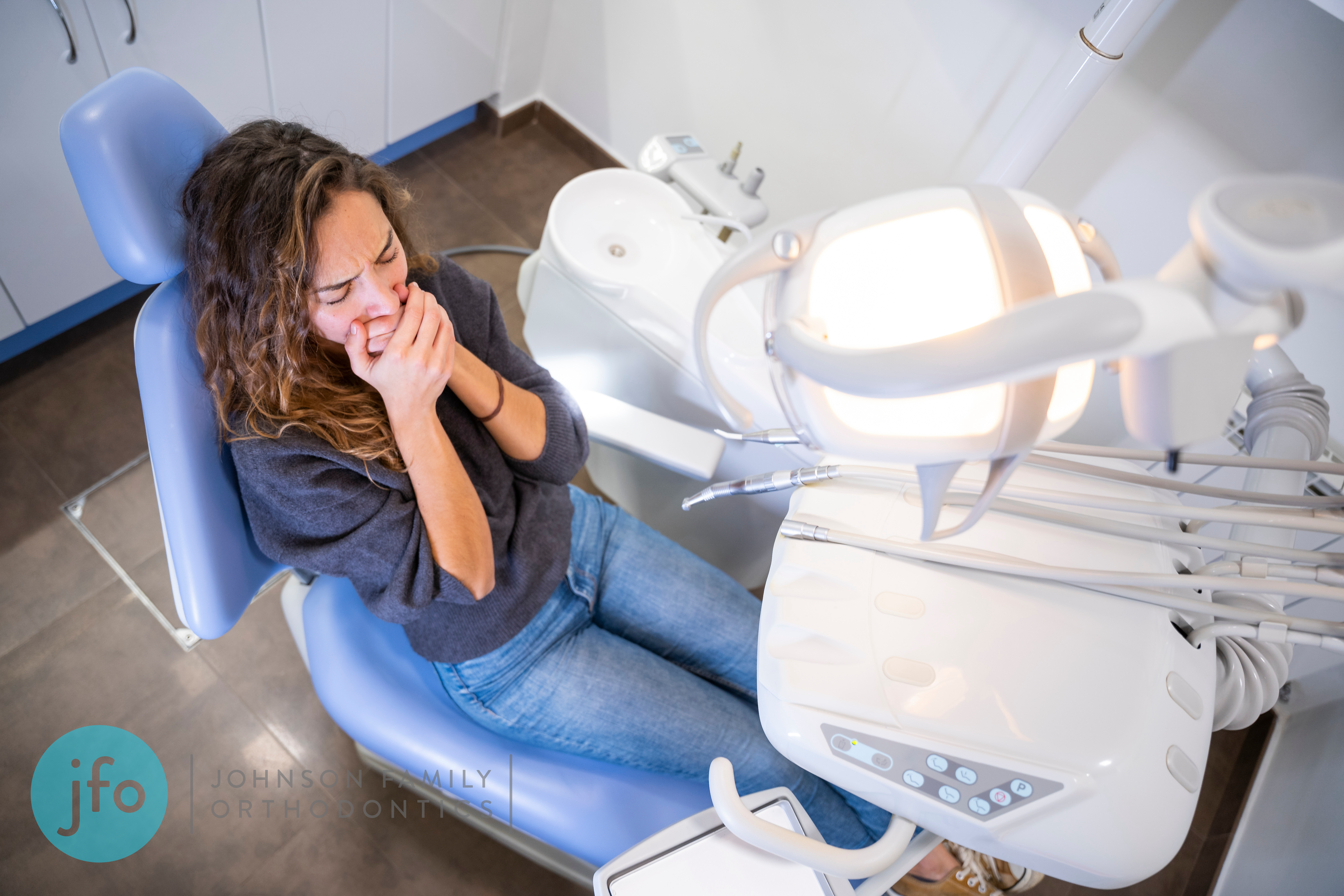You’ve been told by your dentist that you need to see an orthodontist. But, you’ve been literally fighting tooth and nail when it comes to making the appointment. You’ve heard that braces will hurt. So, your mind conjures images of Medieval dental torture appliances anytime you think of making the call.
Although braces can give you a gorgeous smile and healthier teeth, the road to a better smile can be a little uncomfortable. Most people feel a little nervous before visiting an orthodontist. But, sometimes, those nerves can turn into a full-fledged phobia known as dental anxiety.
Yes, doing scary stuff sucks…you’re not the first person to put off getting braces because you’re scared. But, as nerve wracking as visiting the orthodontist might be, the best way to deal with dental anxiety is to face it head-on.
Here’s why.
What is Dental Anxiety?
A little anxiety before a dental procedure or orthodontist appointment is normal. The science-cy term for dental anxiety is dentophobia. Also known as odontophobia, dentophobia is a severe fear of the dentist and dental procedures. According to the World Health Organization, dentophobia affects as much as 20 percent of people. Three percent have severe dental anxiety. Severe anxiety is more common in children and teens.
Like other phobias, dental anxiety is characterized by a severe, persistent fear. This fear is often irrational and proportionally greater than the threat. For dental anxiety to qualify as a phobia, it must persist over a longer period of time.
Why Does Dental Anxiety Occur?
Dental anxiety can develop for many different reasons. Sometimes, it happens because of a previous traumatic experience at the dentist or orthodontist. Other times, people get anxious because of a lack of knowledge about what to expect. Also, the sound of the dental instruments can be a little scary!
Signs You Have Dental Anxiety
Dental anxiety can manifest in many ways. Here are some physical signs of anxiety.
- Racing heart
- Feeling of doom or danger
- Stomach upset, nausea, or diarrhea
- Panic
- Shortness of breath
- Sweating
- Heart palpitations
- Trembling or shaking
- Dizziness or lightheadedness
What You Can Do About Dental Anxiety
Congrats on taking the first step in managing your dental anxiety — by simply acknowledging it. The next step is to find an orthodontist who helps you feel supported and safe. They can help minimize discomfort. This can alleviate a lot of the anxiety. Here are some other things you can do:
- Take a second to regroup – When anxiety strikes, take a moment to take a breather.
- Stick to just the facts – Avoid going to places like Reddit for information. This will likely result in you coming across misinformation and will result in more anxiety. Instead get information about braces straight from your orthodontist.
- Bring along a supportive loved one – Have someone there who is emotionally supportive. They can also take notes of any information that you get from the orthodontist. When you’re anxious, it can be hard to pay attention.
How to Prevent a Panic Attack

Wanna avoid having a panic attack altogether? Great, before your appointment, try the following:
- Practice deep breathing – Deep breathing is one of the best ways to manage anxiety. You can do it anywhere. And, it’s effective. When you practice deep breathing, you are putting your body in a state of calm. It relaxes you. A good deep breathing method is the 4-7-8 technique. To do this, you simply place the tip of your tongue against your front teeth. Then, exhale through your mouth. Next, close your mouth and inhale for 4 seconds. Hold your breath for 7 seconds. Finally, exhale for 4 seconds. Do this a total of 4 times. But, don’t wait until you are in the orthodontist’s chair to do deep breathing. Practice it at least 10 minutes before your appointment.
- Use distraction – If you notice signs that you are becoming anxious, try distracting yourself by playing a game on your phone, listening to music, or texting a friend. Taking just a few minutes to distract yourself can help you calm down.
- Try a countdown – Paying attention to your external environment can help you relax when you are anxious. The “5-4-3-2-1 method” is a mindfulness technique that therapists use to help clients relax. Here’s how to do it. Take a deep breath and close your eyes. Next, count down using your five senses. Name five things you can touch, four things you can see, three things you smell, two things you can hear, and something you can taste.
- Relax your muscles, one at a time – One of the best methods for relieving physical anxiety is progressive muscle relaxation. This exercise allows you to release tension and grounds you in the present moment. To do it, lean back in the chair, and curl your toes then release them. Next, tense all the muscles in your foot. Then, slowly relax the muscles. Do the same for the rest of your muscles, including your legs, stomach, and chest until you reach the top of your head.
- Rehearse – Mentally prepare yourself for the stress. Imagine yourself at the orthodontist’s office. Mentally run through how you will handle the situation. You can practice some of the relaxation techniques above. Rehearing helps you to manage your stress levels better when in the actual situation.
What if Anxiety Strikes During An Appointment?
It’s not as scary or embarrassing as you think (at least not when you visit us!)
Talk To Your Orthodontist
If you let Dr. Johnson know that you are anxious, he will ease your fears with stories of the most epic of creatures, unicorns for most of your visit (depending on what kind of mood he is in). But, if tales of those colorful creatures don’t do the trick, Dr. Johnson has a few other tricks up his sleeve, like giving you calming medications to help you relax.
Give Usa Call
Seeing an orthodontist doesn’t have to be a stressful event. Dr. Johnson cares about how his patient’s feel and will help you get through the appointments with as little stress as possible. When you schedule your appointment, just let us know that you are anxious and we will do our best to help you relax.
